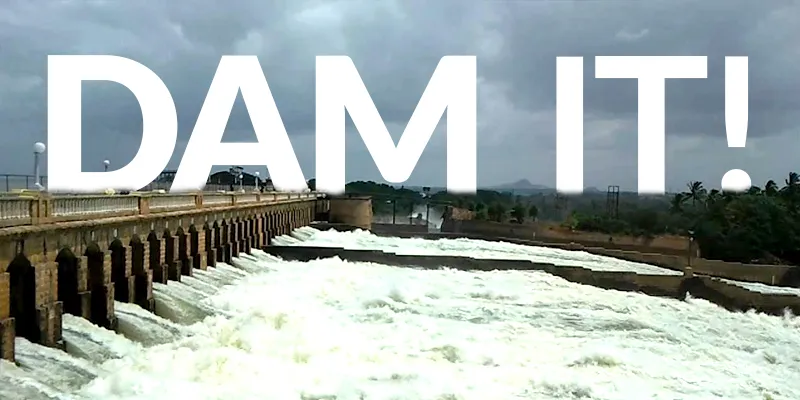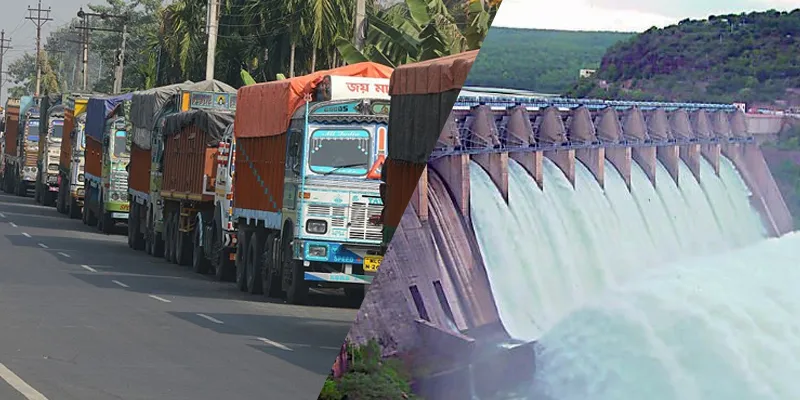Southern water wars disrupt commerce, economy
Saravanan has already spent two nights in his truck parked along the National Highway in Hosur near the Tamil Nadu-Karnataka border. He has been driven to a stall by activists protesting the Supreme Court verdict asking Karnataka to release Cauvery river water to Tamil Nadu.
With a truckload of white goods loaded at the Chennai port and destined for an e-commerce warehouse in east Bengaluru, just 45km across the border, Saravanan will have to spend a third night in the cabin as activists in Karnataka have called for a statewide bandh on September 9.

With yet another round of water wars between the two southern states, commerce has taken a hit, and manufacturing and supplies, so crucial to India’s economic recovery after an almost decade-long hiatus, has come to a grinding halt. The chaos is expected to last over a week — over the weekend and Tuesday’s Eid holiday. This cycle of disruption started with a bandh called by the trade union and transporters on September 2 which was followed by the Supreme Court order this week on Monday.
Saravanan is not alone. There are a thousand trucks in front of and behind him, all of them with Tamil Nadu registration plates. They will be targeted with stones and Molotov cocktails if they dare to cross over. They have all been halted by police as a precautionary measure outside three major checkposts bordering Karnataka — at Hosur, Sathyamangalam, and Gudalur.
These trucks carry manufactured and industrial goods, raw materials, e-commerce orders, harvests, truck cabins, and assembled vehicles. Karnataka cannot ensure security for any of these trucks, and it is easier to stop their entry despite a majority of them only passing through Karnataka’s National Highways to get to other states such as Goa, Maharashtra, and Gujarat.
The activists who have called for the bandh and who started their menacing postures three days earlier are in no hurry to end the impasse as Karnataka’s Chief Minister Siddaramaiah has agreed to release water with 'a heavy heart.'
No panic button yet
While e-commerce and logistics companies claim it is still too early to press the panic button on disruption, they do claim there are no last mile-delays yet.
When asked if this disruption will have an impact on logistics and e-commerce players, Sahil Barua, Co-founder and CEO, Delhivery, said:
I don’t see an impact on demand as people will still buy online. The current disruption won’t be for very long. If there is a bandh call, logistics companies may have to halt operations for a day or two. As of now, there has not been any major disruption and deliveries are being made.
Navneet Singh, Co-founder and CEO, NuvoEx Logistics, said there are no delays that he has come across.
There could be a lag as far as shipments moving from Chennai are concerned, but there is no last-mile problem so far. In tier II and III cities where e-commerce is catching up, whenever such problems arise, e-commerce companies don’t take orders till the situation improves. We expect the volumes to remain normal.
However, with protests unlikely to lose steam soon, such companies will have to deal with an increase in the number of complaints which are already trickling in.
History of shame

The sharing of Cauvery water is an issue that predates the formation of the Indian union and despite a final award by the Cauvery Water Disputes Tribunal in 2007, the respective states politicise the issue every few years, leading to damage to property and even lives.
In 1991, Karnataka’s then CM, S. Bangarappa, provided state support to a bandh call which forever left an ugly scar between the two states as Tamil-speaking people in the southern Mysore area were targeted and killed brutally by protesting mobs.
The dispute dates back to the British era and has carried on in independent India with chief ministers of both states upping the ante every time there is a shortage of water.
Cauvery Water Disputes Tribunal
With the dispute going out of hand and often being extreme, the Supreme Court, after giving a chance to both the states to come to an agreement which they failed to do, directed the Centre to constitute a tribunal and distribute the water among the two states, Puducherry, and Kerala, which are also eligible for a share.
In 1991, the tribunal, based on 10 years of average inflows, directed Karnataka to ensure that 205 tmcft of water flowed into Mettur dam on the border between the two states. It also directed Karnataka not to increase the area of irrigated land. All hell broke loose and riots followed.
Further legal complications set in when Karnataka rejected the tribunal order and sought to get it annulled, but the SC refused to set it aside. The Centre then passed an ordinance. A few years passed by peacefully as there were copious rains, but the issue did trouble relations between the two states from time to time.
In 2007, the Cauvery Water Disputes Tribunal gave out the final award after years of deliberation. It apportioned 419tmcft to Tamil Nadu, 270tmcft to Karnataka, 30tmcft to Kerala, and 7tmcft to Puducherry. Tamil Nadu and Karnataka found the amounts apportioned to them to be far too little. Fed up with the stance of the two bickering states, the Centre notified the final award in 2013.
It is in this context that the latest spat was triggered when the SC directed Karnataka to release 15,000 cusecs per day over the next 10 days.
Bandh gets wide support
The Karnataka bandh called on September 9 seems to have complete support from the state’s political parties, cine stars, pro-Kannada activists, lawyers, and transport owners, with schools, colleges, government offices, state transport, and cable television entertainment remaining closed. Posses of policemen have been deployed across Bengaluru at vital installations, state borders, as well as sensitive areas across the state. Already, for the third day running, life has remained paralysed between Bengaluru and Mysore as farmers in the Cauvery basin have blocked roads and rail lines in protest, urging the state not to release any water.
For the first time, ITeS workers too joined the protest at Electronics City in Bengaluru on Thursday and came out in support of the bandh call.
The BJP has been caught in a cleft as the party’s Karnataka unit has decided to support the bandh while its Tamil Nadu unit has asked the neighbouring state to release water.
As Karnataka readies for a confrontation, for Saravanan and his ilk, the roadside eateries and wine stores are the only respite from the fear of a mob attack.







